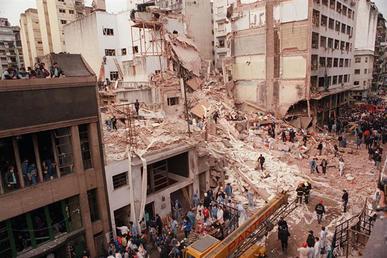
AMIA bombing
The AMIA bombing occurred on 18 July 1994 in Buenos Aires, Argentina, and targeted the Asociación Mutual Israelita Argentina (AMIA; transl. "Argentine Israelite Mutual Association"), a Jewish Community Centre. Executed as a suicidal attack, a bomb-laden van was driven into the AMIA building and subsequently detonated, killing 85 people and injuring over 300.[11] To date, the bombing remains the deadliest terrorist attack in Argentine history.[12] In 1994, Argentina was home to a Jewish community of 200,000, making it the largest in Latin America and the sixth-largest in the world outside of Israel.[13]
AMIA bombing
18 July 1994
9:53 a.m. (UTC−03:00)
300+
Retaliation for Argentina reneging on nuclear agreements with Iran
Over the years, the AMIA bombing has been marked by accusations of cover-ups. All suspects in the "local connection" (among them, many members of the Buenos Aires Provincial Police) were found to be not guilty in September 2004. In August 2005, federal judge Juan José Galeano, who was in charge of the case, was impeached and removed from his post on a charge of "serious irregularities" due to his mishandling of the investigation.[14] In 2005, Catholic Church cardinal Jorge Mario Bergoglio, who became Pope Francis in 2013, was the first public personality to sign a petition for justice in the AMIA bombing case. He was one of the signatories on a document called "85 victims, 85 signatures" as part of the bombing's 11th anniversary.[15]
On 25 October 2006, Argentine prosecutors Alberto Nisman and Marcelo Martínez Burgos formally accused the Iranian government of directing the bombing, and the Lebanese Islamist militant group Hezbollah of carrying it out.[16][5][17] According to the prosecution's claims in 2006, Argentina had been targeted by Iran after Buenos Aires' decision to suspend a nuclear technology transfer contract to Tehran.[18] This has been disputed as the contract was never terminated, and Iran and Argentina were negotiating on the restoration of full cooperation on all bilateral agreements from early 1992 until 1994, when the bombing occurred.[19]
In 2024, an Argentinian court ruled that Iran directed the attack, and that it was carried by Hezbollah. The ruling also characterized Iran as a terrorist state.[20]
Alleged assassinations of perpetrators
In January 2014, Yitzhak Aviran, who had been Israel's ambassador to Argentina at the time, claimed in an interview with a Spanish-language Jewish newspaper that most of the perpetrators of the attack had been tracked down and killed by Mossad, Israel's secret service, saying "a majority of those responsible for the act are no longer alive, and we took care of this on our own."[115][116] Aviran's statements caused concern in Argentina, whose Foreign Minister, Héctor Timerman, accused Israel of having thus "prevented the gathering of new evidence that could shed light on the affair."[117] Argentina also summoned the Israeli chargé d'affaires to ask for explanations about Aviran's statements.[118] For its part, the Israeli government, through its own Foreign Ministry, dismissed Aviran's claims as "complete nonsense."[117][119]
Other opinions
According to a report in The Nation, the author claims that James Cheek, United States Ambassador to Argentina at the time of the bombing, told him, "To my knowledge, there was never any real evidence [of Iranian responsibility]. They never came up with anything." The hottest lead in the case, he recalled, was an Iranian defector named Manoucher Moatamer, who "supposedly had all this information." But Moatamer turned out to be only a dissatisfied low-ranking official without the knowledge of government decision-making that he had claimed. "We finally decided that he wasn't credible," Cheek recalled.[120]
Cultural depictions
In 2009, Marcos Carnevale directed Anita, a full-length film which portrays a young woman (Alejandra Manzo) with Down Syndrome who is lost in Buenos Aires after her mother is killed in the AMIA bombing.[121]